I’m one of the 1 in 37 living with Parkinson’s – that’s currently around 153 000 in the UK.
There are travel blogs about Parkinson’s people having extreme adventures -such as travelling to
Afghanistan, climbing Mount Fuji, walking around Britain’s coast. They’re right in saying
most people are friendly, give you respect and willingly help. But I’m talking about the rest
of us. who just want to gently explore the marvellous landscapes and peoples that make up
our world.
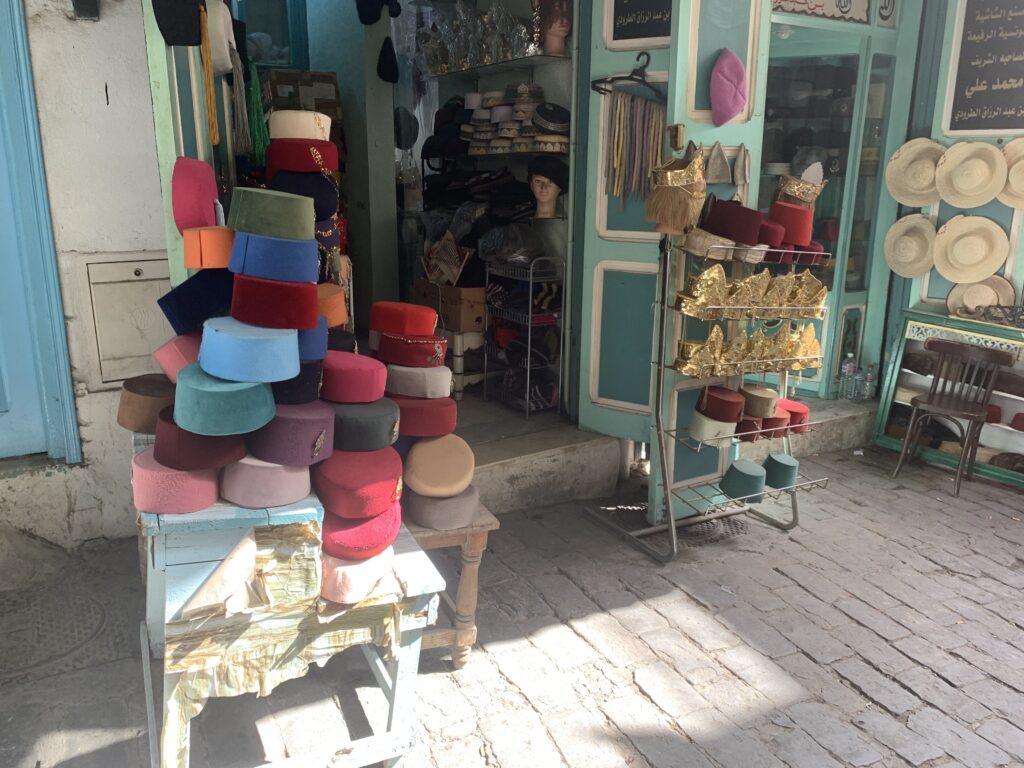
The Fez shop. Tunis Medina
My Story
I’ve just come back from a month’s exploration of southern Europe and North Africa all solo!
I was diagnosed with Parkinson’s 3 years ago and decided this challenge needed
determined action. Like many of our age group (I’m 69) I have the additional complication
of severe hearing loss. Exercise classes, table tennis, 5 mile jogging, and Tai Chi all help.
But the thing which opened the world to me is travel. Takes you out of your familiar home
environment to a kaleidoscope of new experiences and landscapes, making new friends,
nothing is more effective against the determined enemy that is Parkinson’s
We’ll look at making travel arrangements, taking medication, what equipment to take,
getting the right insurance.
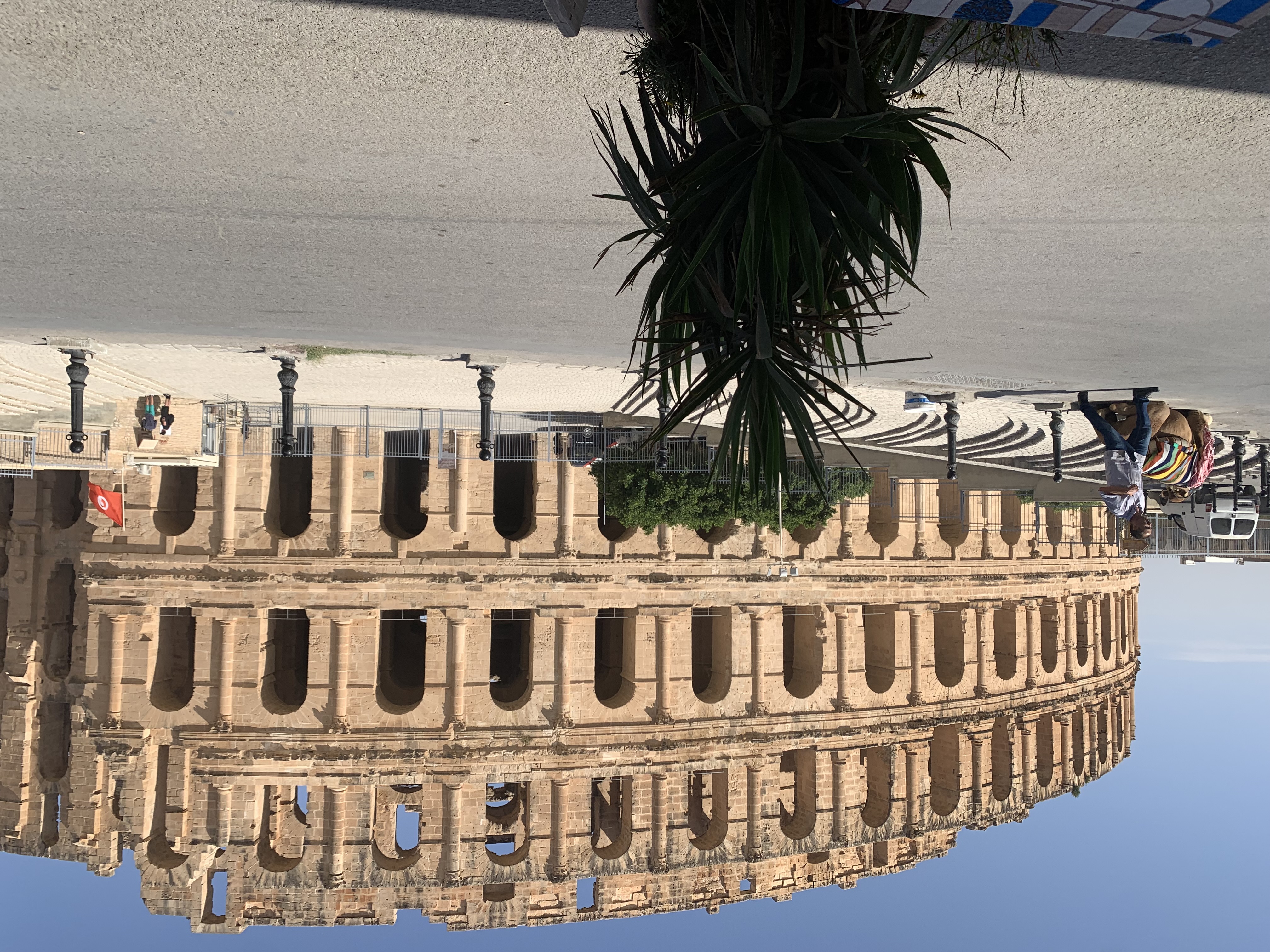
Coliseum at El Jem, Tunisia
Planning a trip
Unless you book a package arrangement, careful planning is key to success. In Europe,
my preference is for train travel using an Interrail pass – you’ll need to know how long it
takes to get from place to place using the Eurail map
https://www.google.com/maps/d/viewer?mid=1rz5t987I69YzmOAKnI-
H0M7fHZ4&femb=1&ll=50.750109679294575%2C-7.774175372435902&z=6. This
includes ferry links from Bari to Patras on the Adriatic and Piraeus to the Greek islands,
although there are many other ferry crossings in Europe.
I put together an itinerary on an Excel spreadsheet – here’s an example from my last trip
https://docs.google.com/spreadsheets/d/1T8agcREZucBR8EG1PNKy-q9bJsz-
gajD/edit#gid=59221037 but it works equally well if you feel more comfortable in
handwritten form. Many of us have a bucket list – this is a good starting point for designing
your own trip. Create a spreadsheet or make a list with day by day entries listing the day
and date (it’s surprisingly easy to get muddled so be precise).
Next column that day’s journey, that night’s accommodation, other activities e.g. visit the Alhambra in Granada and
a final column the cost – I find keeping it in Euros is easiest.
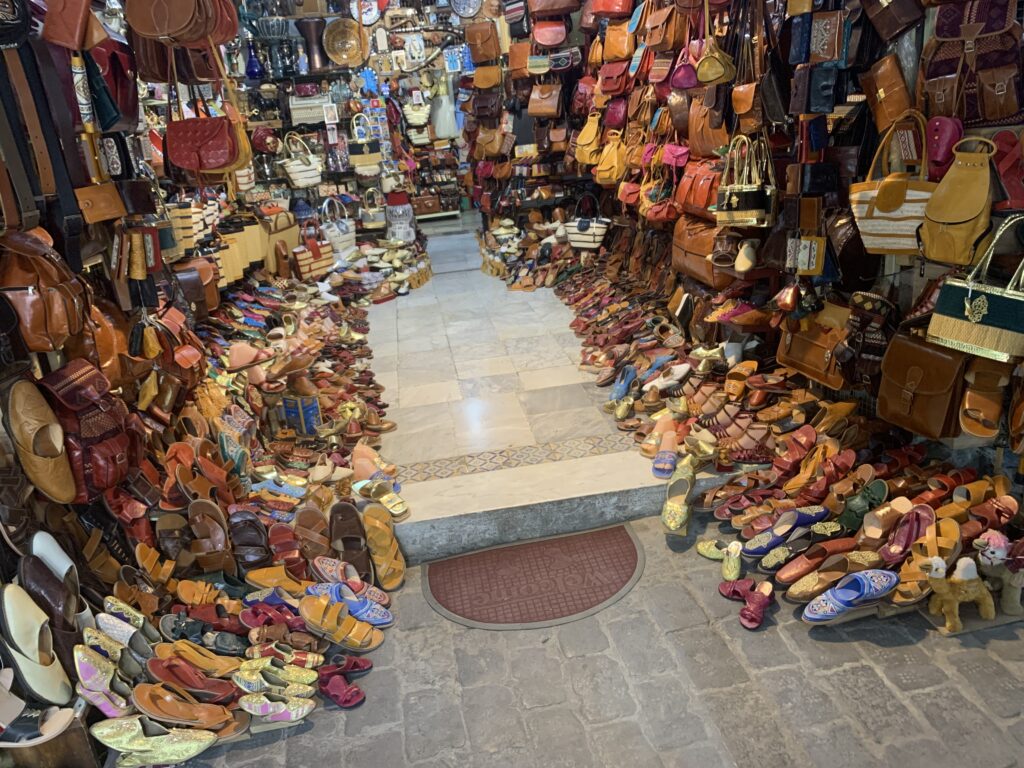
Leather shoes and handbags shop, Tunis Medina
Trains and hotels
On trains unlike the UK where there is little height difference between platform and carriage,
in Europe there are often 2 or 3 steps up, quite awkward with heavy luggage. Some more
recent European carriages have an entry point almost level with the platform, but regrettably
not Eurostar. Ask for help, most youngsters are happy to assist. Some European railways
offer wheelchair assistance but this would need to be booked in advance.
The range of overnight accommodation is vast ranging from hostels to Air bnb to luxury, but
I find it best to stick with one hotel booking agency such as booking.com. Although it can
be cheaper to book directly with the accommodation provider, dealing with the admin e.g
last minute switch of dates can be time consuming. I would advise booking all
accommodation in advance as some countries will want to know where you’re staying. It’s
best to book hotels with payment when you check out of the hotel to give maximum
flexibility.
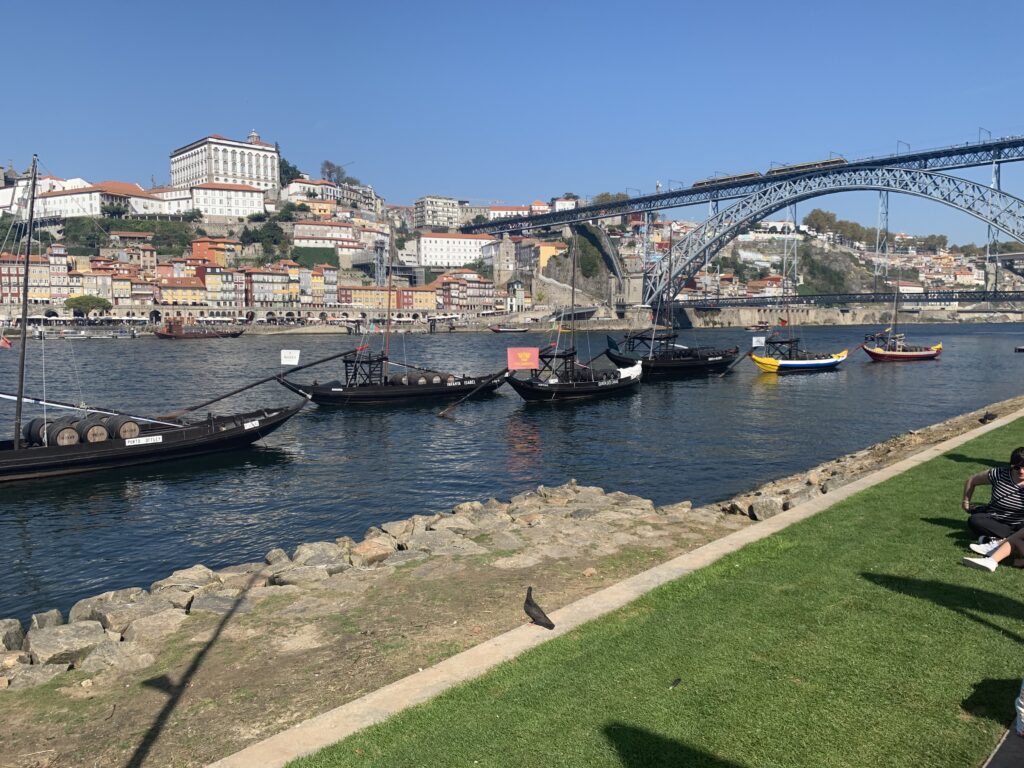
River Douro at Vila Nova de Gaia, Porto
Be prepared
If you’re travelling outside Europe check the Foreign Office website for any local issues
which may affect your plans, I make it a rule to keep clear of any demonstrations. If
travelling to the EU on the day of entry you must ensure your UK passport has been issued
less than 10 years ago. Further, when exiting the EU, you must have at least 3 months left
before the UK passport expiry date. These rules also apply for travel on a UK passport to
Switzerland, Norway and Iceland. Also check with the embassy of the countries being
visited for any visa or vaccination requirements. Although some countries such as Egypt
allow you to buy a visa on arrival, you need to be quite certain to avoid being refused entry.
On the other hand I don’t book attractions in advance at my destination. Don’t be lured into
buying in advance by sites such as tripadvisor on the basis they’re nearly ‘sold out’. Staying
in Catania I could have booked a day trip in advance to mount Etna, but as that excursion is
weather dependent I checked the weather forecast and booked locally. Another time I was
staying in Palermo, the vibrant capital of Sicily, and decided on the spur of the moment on
a lovely sunny day to visit Cefalu, a charming seaside resort 30 minutes away by train. On
the other hand in a more unfamiliar environment of Tunisia I booked a guide at the hotel to
visit the coliseum at El Jem 2 hours away, who also arranged a tasty fish lunch!
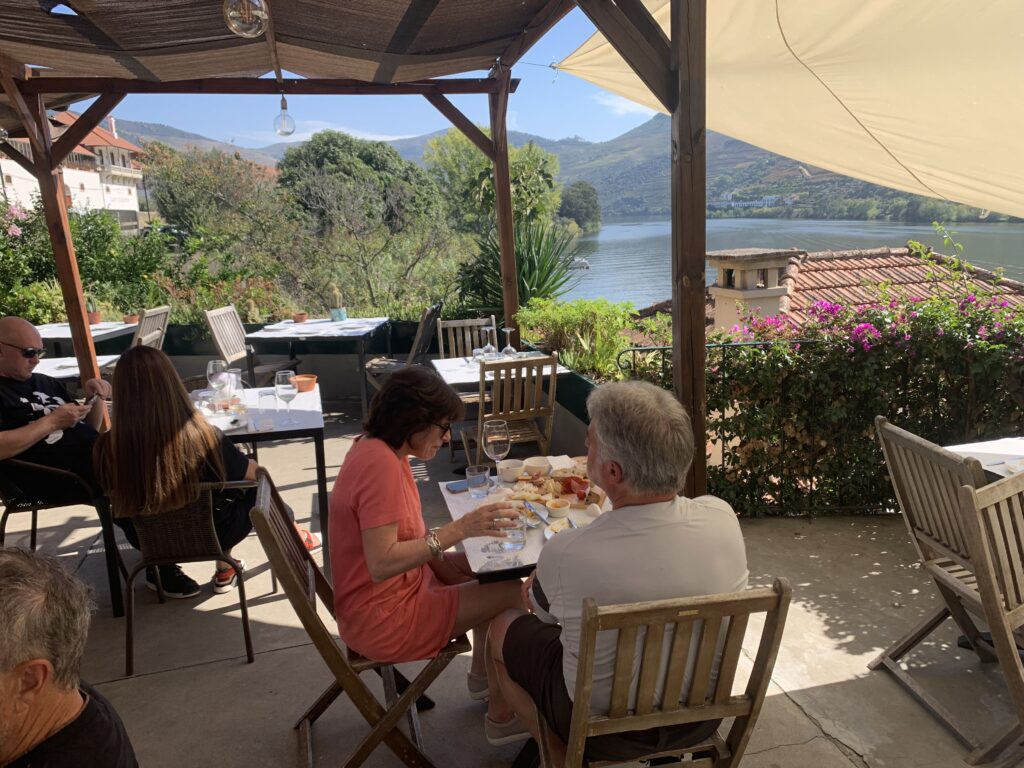
Writer’s Restaurant overlooking the Douro at Pinhao.
The international situation is in constant flux – I had to switch from Marrakech to Tunis
because of the earthquake last summer. The Trans Siberian is off limits due to the war in
Ukraine and China’s zero Covid policy. All train services have been suspended from
Europe to Russia.
Ticket to Ride!
For many of us, time and budgetary constraints restrict travel to continental European and
North African countries. I base my train travel costs on an Interrail pass for anything up to 1
month, provided you’re a resident of a European or a North African country. Although this
can cost more than buying individual tickets for each journey, you get much more flexibility.
Although this Europe wide ticket gives a useful cost baseline, it doesn’t include seat and
sleeper reservations. The network of overnight trains in Europe is growing. They offer
sharing in couchette (bunk beds) or in a private cabin and can save a night’s hotel
accommodation cost.

Don’t get me wrong, I’m not against low cost flights which can save time, and for some
destinations such as Egypt there is no overland alternative. But by taking the train and ferry
you gradually acclimatize to new environments, adjusting naturally to the new landscapes,
and chat to fellow passengers be they locals or other travellers.
Medical Matters
Concerning Medical matters, a first Aid kit is essential along with any medication which
should be split between hand luggage and wheely case. You should also bring a copy of
your prescription as border officials may want justification for carrying these drugs. It’s also a good idea to take a doctors’ letter giving details of your medicine (the generic name not the brand) and the health condition you need the medicine for. The GP practice may make a charge for this.
Comprehensive travel insurance is a must with Parkinson’s declared as a pre existing
illness. Check the countries covered as I found that Staysure doesn’t cover Spain unless
you specifically request it. If appropriate take sun tan lotion, also hand sanitiser useful if you
can’t wash your hands. Take 1 or 2 collapsible walking sticks, some of the transfer stations
have long walks, also for walks to viewpoints at the resort can be quite uneven.
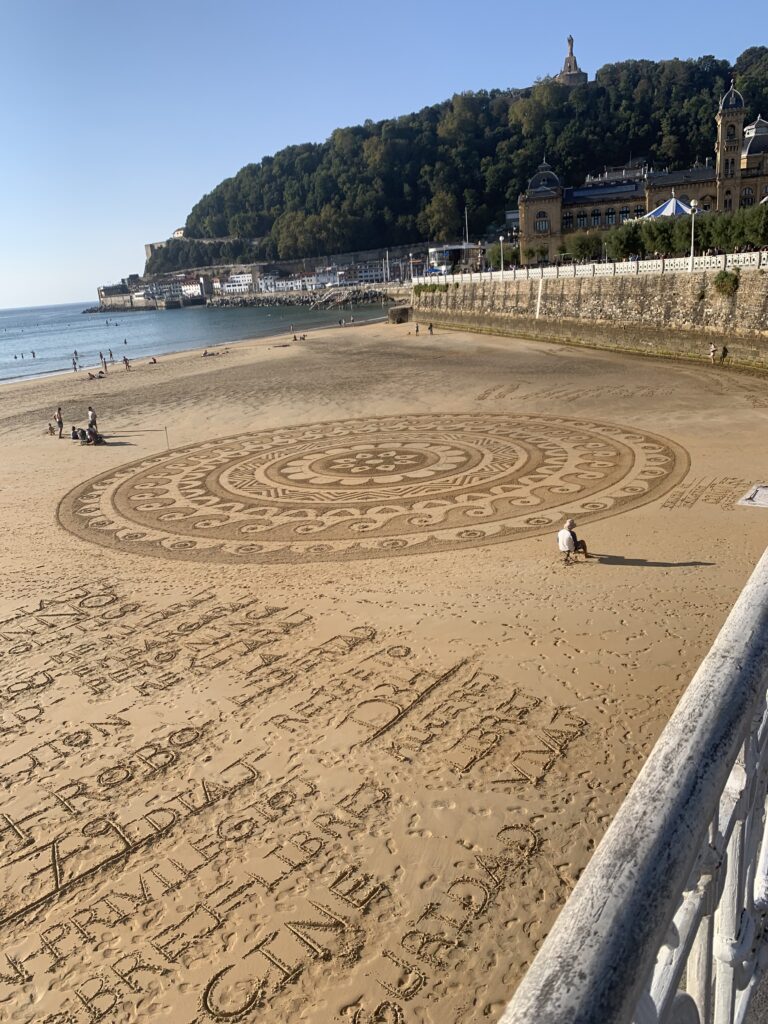
Clothing and tech requirements
The clothing list is not long, take a jacket, 2 pairs of trousers, 4 shirts, a vest, a pullover and 10 seats
of underpants and socks as appropriate. A travel towel can be very useful! I usually plan to
have a laundry stop every 7 to 10 days, either getting the hotel to do it or going to a
laundrette. Take the usual toiletries.
Having reliable tech with you can make or break the experience. I have an old phone which
I take with me with a line to a loop on my belt. As it has my tickets on there as well as an
immediate source of information, it’s mission critical. I also take an IPad in the evening to
record the day’s adventure. If you’re into social media, use it to update your adventures with
photos and videos. To ensure the WI-FI security I subscribe to a VPN connection and also
allow you to access BBC I player not normally available outside the UK. An Anker power
bank keeps everything charged up – I don’t like to rely on hotel and train power supply.
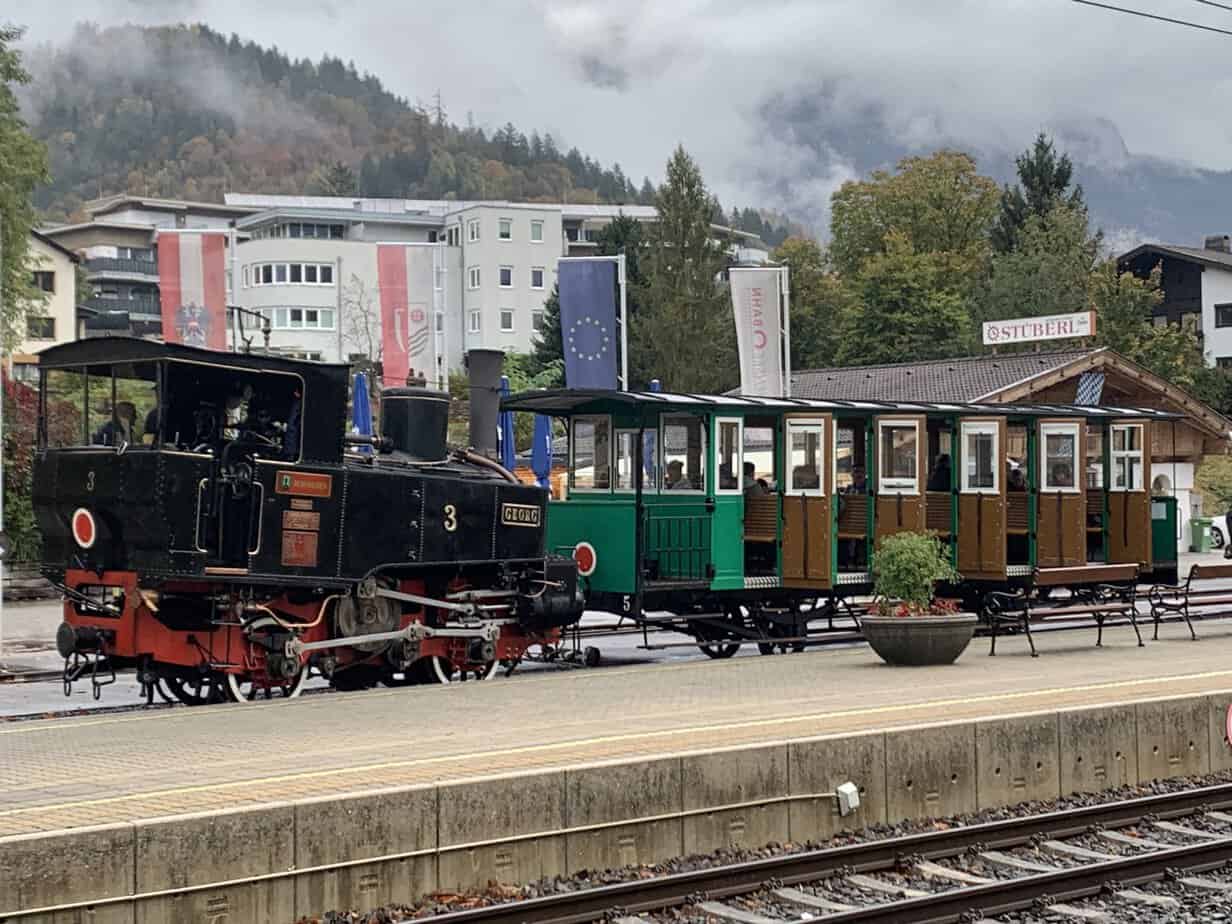
Steam train at Jenbach to Achensee, Austria.
Seat 61 – make it your ‘Bible’
The ‘bible’ for all train adventures around the globe is www.Seat61.com. It contains
invaluable information about train and ferry itineraries and forthcoming developments,
invaluable for planning your itinerary. Much of this information is tricky to find on the internet. Run by Mark Smith he has assembled all this disparate information in a highly readable form, which he prides himself in keeping as up to date as possible.
And Finally
I hope this serves a useful introduction to travel for people with Parkinson’s. There’s a
fascinating world to uncover out there in all its wonderful diversity!. It can seem daunting, but the rewards you will gain from inspiration travel affords is amazing!
